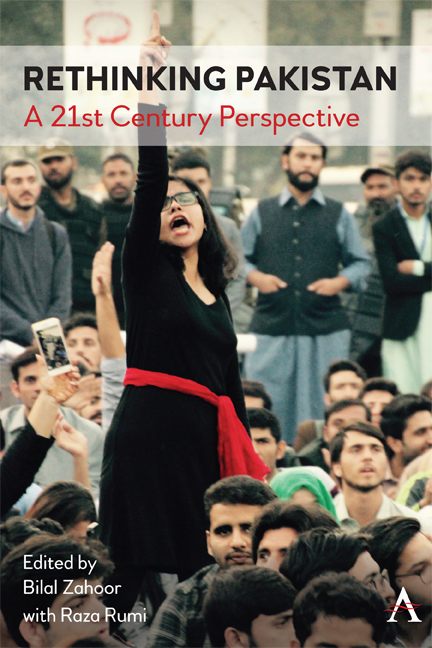Book contents
- Frontmatter
- Dedicated
- Contents
- Acknowledgements
- Introduction
- Part I Identity, Religion and Radicalisation
- Part II Development, Reform and Governance
- Part III Rights, Repression and Resistance
- Part IV Sex, Gender and Emancipation
- Part V Conflict, Diplomacy and Foreign Policy
- Contributors
- Bibliography
- Index
Chapter 20 - In Search of a Pakistani Feminist Discourse
Published online by Cambridge University Press: 20 January 2022
- Frontmatter
- Dedicated
- Contents
- Acknowledgements
- Introduction
- Part I Identity, Religion and Radicalisation
- Part II Development, Reform and Governance
- Part III Rights, Repression and Resistance
- Part IV Sex, Gender and Emancipation
- Part V Conflict, Diplomacy and Foreign Policy
- Contributors
- Bibliography
- Index
Summary
A burgeoning feminist movement is underway in Pakistan, but it can succeed only when it starts mirroring the makeup of the women and the society for which it operates – and this country is tricky territory for feminists. Open hostility towards feminism persists based on the deliberate misunderstanding put about by conservative politicians and the religious right that feminism is about hatred of men, Western (and therefore alien) values and moral licentiousness. A certain amount of rehabilitation towards the image feminism has to take place in Pakistan before women can truly become cognisant of the perniciousness of the system that they have been conditioned to accept. Pakistan needs a feminism that elegantly marries both the secular and Islamic tendencies because the country, I believe, was created on the basis of both secular and Islamic principles.
Women make up 52 per cent of Pakistan's population, yet even in the twenty-first century many of them are treated as second class citizens. The struggle for women's empowerment is well underway in the country, but much of it is based on economic factors and financial necessities: women are touted as the missing factor in Pakistan's economy and their inclusion in the labour force is seen as the magic bullet that will fix both the country's economy and their unequal standing in the society. But that is not the whole story.
Deliberate feminist action is the mechanism that Pakistan desperately needs to address the gaping disparity between men and women. But before that, certain theoretical dilemmas must be resolved. First, is feminism compatible with Pakistan's official religion, Islam? Second, how can Pakistani feminism overcome entrenched cultural traditions stemming from the patriarchal nature of our particular sociocultural makeup? Third, what should such a feminism look like? This chapter attempts to answer these questions, first by contextualising the problem of gender inequality and illustrating its scope and then by presenting an argument as to why Pakistan needs feminism to embark on the road to progress and prosperity. The latter part of the argument would be approached through real-world examples coupled with a personal testimony.
Is Islam Compatible with Feminism?
Islam embodies many of the principles that feminism fights for: equality, dignity and respect for women.
- Type
- Chapter
- Information
- Rethinking PakistanA 21st Century Perspective, pp. 209 - 216Publisher: Anthem PressPrint publication year: 2020



